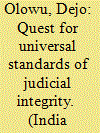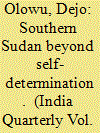|
|
|
Sort Order |
|
|
|
Items / Page
|
|
|
|
|
|
|
| Srl | Item |
| 1 |
ID:
120734


|
|
|
|
|
| Publication |
2013.
|
| Summary/Abstract |
While the Bangalore Principles of Judicial Conduct, 2002, are not binding on states, they evidence high-level support for the principle of judicial integrity. In addition, superior courts and judiciaries of diverse legal traditions have relied on the Bangalore Principles in codifying their minimum standards of judicial integrity. Extrapolating from some of the core values of the Bangalore Principles, this article accentuates some of the critical challenges implicated in establishing credible, independent and accountable judiciaries. Beyond the task of developing appropriate mechanisms for ensuring judicial integrity, this article assesses the follow-up efforts to the Bangalore Principles, such as the draft Lusaka Measures on the Implementation of the Bangalore Principles on Judicial Conduct, 2010, contending that while these measures seek to quantify the critical elements of the Bangalore Principles, there are still areas of concern. This article addresses a plethora of pertinent questions, advocating that the mechanisms for judicial integrity should not be entirely controlled by the judiciary but be made to accommodate sufficient lay representation, and furthermore, that current codes of judicial conduct be formulated as enforceable rules and procedures in ways that would sustain public confidence in judicial processes.
|
|
|
|
|
|
|
|
|
|
|
|
|
|
|
|
| 2 |
ID:
109033


|
|
|
|
|
| Publication |
2011.
|
| Summary/Abstract |
After decades of sanguineous struggle for political and economic self-determination, the peoples of South Sudan eventually voted en masse for the emergence of the newest African state: the Republic of Southern Sudan. Beyond the euphoria of national liberation, however, this article traces similar experi-ences in the assertion of self-determination and how their dynamics could relate to post-liberation Southern Sudan. It is argued that beneath the broadly unifying theme of 'national' resistance to northern oppression lies more complex and ongoing struggles over the ownership and control of core historical narratives, identities, symbols and resources. Despite the pervasive ambience of fear, scepticism and caution in which Southern Sudan will ultimately emerge as a full-fledged sovereign state in July 2011, this article highlights certain variables that could turn out to be the lessons for and from this embryonic state. While not failing to point to the inherent frailties of this new state, this article strongly canvasses the collaboration of internal and external forces in turning Southern Sudan's challenges and opportunities into veritable vehicles for making this entity a successful African story in post-independence nation-building and development as well as a unique contribution to self-determination discourses in an atmos-phere of sustainable peace and prosperity.
|
|
|
|
|
|
|
|
|
|
|
|
|
|
|
|
|
|
|
|
|